
by Laura Tiu | Aug 3, 2018
Written By: Laura Tiu, Holden Harris, and Alexander Fogg
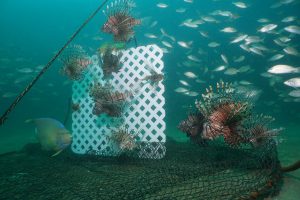
Non-containment lionfish traps being tested by the University of Florida offshore Destin, FL. Invasive lionfish are attracted to the lattice structure, then captured by netting when the trap is pulled from the sea floor. The trap may have the potential to control lionfish densities at depths not accessible by SCUBA divers. [ALEX FOGG/CONTRIBUTED PHOTO]
Red lionfish (Pterois volitas / P. miles) are a popular aquarium fish with striking red and white strips and graceful, butterfly-like fins. Native to the Indo-Pacific region, lionfish were introduced into the wild in the mid-1980s, likely from the release of pet lionfish into the coastal waters of SE Florida. In the early 2000s lionfish spread throughout the US eastern seaboard and into the Caribbean, before reaching the northern Gulf of Mexico in 2010. Today, lionfish densities in the northern Gulf are higher than anywhere else in their invaded range.
Invasive lionfish negatively affect native reef communities. They consume and compete with native reef fish, including economically important snappers and groupers. Their presence has shown to drive declines in native species and diversity. Lionfish possess 18 venomous spines that appear to deter native predators. The interaction of invasive lionfish with other reef stressors – including ocean acidification, overfishing, and pollution – is of concern to scientists.
Lionfish harvest by recreational and commercial divers is currently the best means of controlling their densities and minimizing their ecological impacts. Lionfish specific spearfishing tournaments have proven successful in removing large amounts in a relatively short amount of time. This year’s Lionfish Removal and Awareness Day removed almost 15,000 lionfish from the Northwest Florida waters in just two days. Lionfish is considered to be an excellent quality seafood, and they are now being targeted by a handful of commercial divers. Several Florida restaurants, seafood markets, and grocery stores chains are now regularly serving lionfish.
While diver removals can control localized lionfish densities, the problem is that lionfish also inhabit reefs much deeper than those that can be accessed by SCUBA divers. Surveys of deepwater reefs show lionfish have higher densities and larger body sizes than lionfish on shallower reefs. In the Gulf of Mexico, the highest densities of lionfish surveyed were between 150 – 300 feet. While SCUBA diving is typically limited to less than 130 feet, lionfish have been observed deeper than 1000 feet.
For the past several years, researchers have been working to develop a trap that may be able to harvest lionfish from deep water. Dr. Steve Gittings, Chief Scientist for the Office of National Marine Sanctuaries at the National Oceanic and Atmospheric Administration, has spearheaded the design for a “non-containment” lionfish trap. The design works to “bait” lionfish by offering a structure that attracts them. The trap remains open while deployed on the sea floor, allowing fish to move in and out of the trap footprint. When the trap is retrieved, a netting is pulled up around
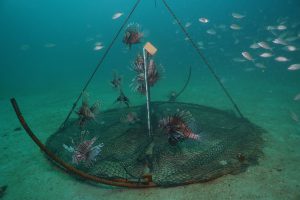
Deep water lionfish traps being tested by the University of Florida offshore Destin, FL. [ALEX FOGG/CONTRIBUTED PHOTO]
The researchers are headed offshore to retrieve, redeploy, and collect data on the lionfish traps. Twelve non-containment traps are currently being tested offshore NW Florida. The research is supported by a grant from the Florida Fish and Wildlife Conservation Commission. The study will try to answer important questions for a new method of catching lionfish: where and how can the traps be most effective? How long should they be deployed? And, is there any bycatch (accidental catch of other species)?
Recent trials have proved successful in attracting lionfish to the trap with minimal bycatch. Continued research will hone the trap design and assess how deployment and retrieval methods may increase their effectiveness. If successful in testing, lionfish traps may become permitted for use by commercial and recreational fisherman. The traps could become a key tool in our quest to control this invasive species and may even generate income while protecting the deepwater environment.
Outreach and extension support for the UF’s lionfish trap research is provided by Florida Sea Grant. For more information contact Dr. Laura Tiu, Okaloosa and Walton Counties Sea Grant Extension Agent, at lgtiu@ufl.edu / 850-689-5850 (Okaloosa) / 850-892-8172 (Walton).
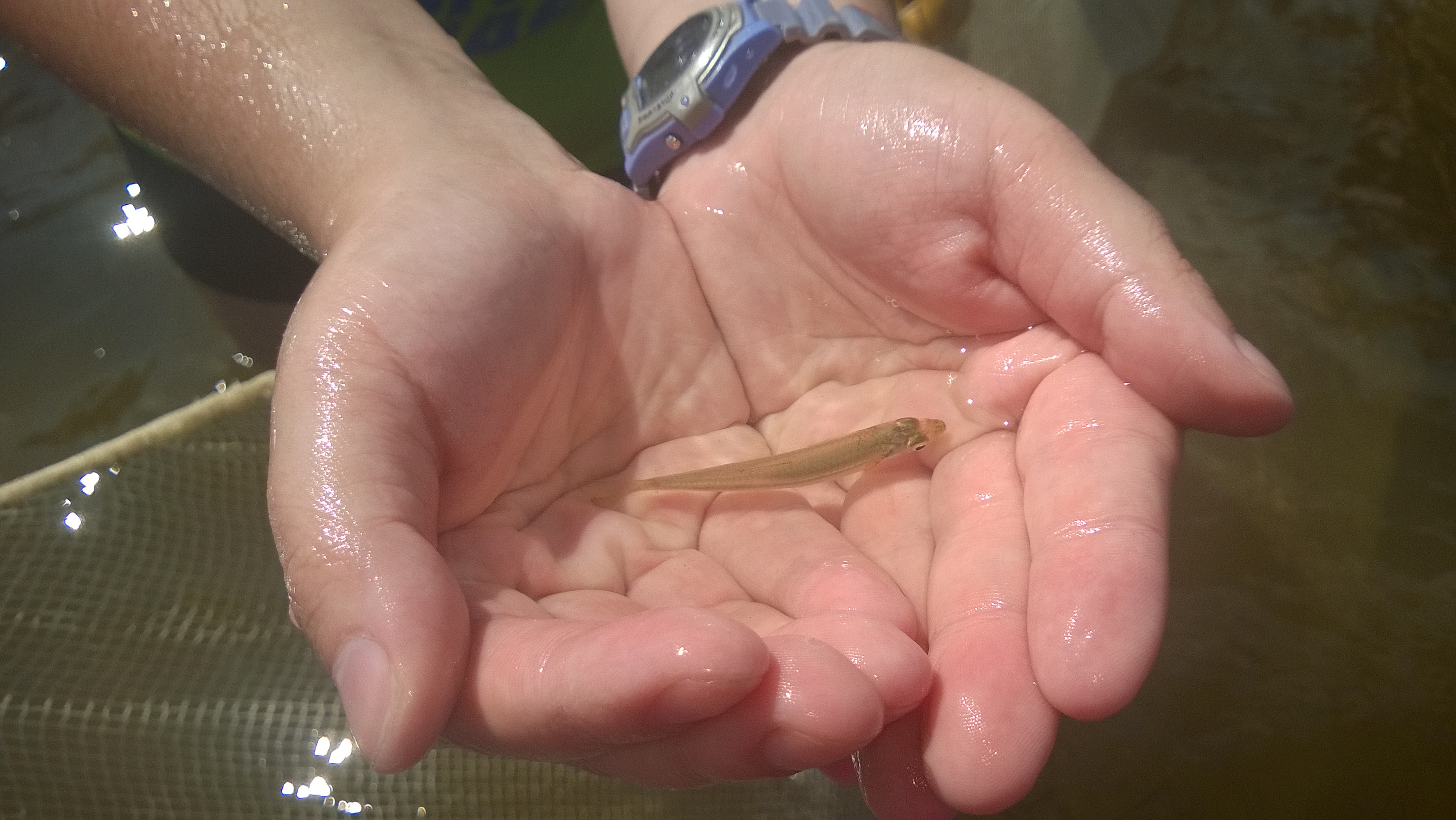
by Laura Tiu | May 12, 2018
Are you interested in learning about marine life, going fishing, or exploring the underwater world with a mask and snorkel? If so, this is the camp for you! This local education opportunity for budding marine scientists will be happening this summer at Camp Timpoochee in Niceville, FL. The camps enable participants to explore the marine and aquatic ecosystems of Northwest Florida; especially that of the Choctawhatchee Bay. Campers get to experience Florida’s marine environment through fishing, boating snorkeling, games, STEM (science, technology, engineering & math) activities and other outdoor adventures. University of Florida Sea Grant Marine Agents and State 4-H Staff partner to provide hands-on activities exploring and understanding the coastal environment.
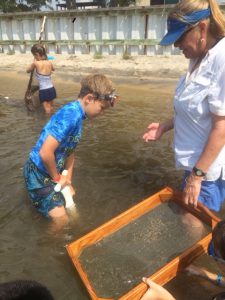
Sampling the benthic community at Timpoochee.
Florida Sea Grant has a long history of supporting environmental education for youth and adults to help them become better stewards of the coastal zone. This is accomplished by providing awareness of how our actions affect the health of our watersheds, oceans and coasts and marine camp is a great opportunity for sharing that information. Many of the Sea Grant youth activities use curriculum developed by the national Sea Grant program and geared toward increasing student competency in math, science, chemistry and biology. The curriculum is fun and interesting!
Marine Camp is open to 4-H members and non 4-H members between the ages of 8-13 (Junior Camp) and, new this year, ages 14-17 (Senior Camp). There will be two Junior Camps in 2018. The July 23-27 camp is full, but there are still openings for the June 25-29 session. The cost for Junior Marine Camp is $275.00 for the week. A more intensive Senior Marine Camp has been scheduled for July 16-20. This camp will contain a community service component and costs $300 for the week.
If Marine Camp sounds interesting to someone you know, visit the Camp Timpoochee website at http://florida4h.org/camps_/specialty-camps/marine/ for the 2018 dates and registration instructions. A daily snack from the canteen and a summer camp T-shirt are included in the camp fees, along with three nutritious meals per day prepared on site by our certified food safety staff. All cabins are air-conditioned. So many surprises await at marine camp, come join the fun.
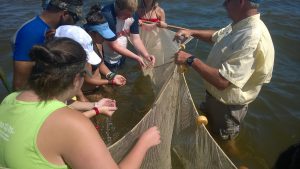
Seining the sea grass at Timpoochee.
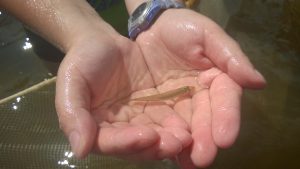
Larval fish in the Timpoochee oyster reef.
by Laura Tiu | Apr 14, 2018
Spring has sprung and it is time to get outside and explore this great Florida Panhandle area. In neighboring Santa Rosa County, a terrific destination for a variety of outdoor activities is Blackwater River State Park. Visitors can canoe, kayak, tube, fish and swim the river. Hikers can enjoy trails through nearly 600 acres of undisturbed natural communities. Bring a picnic and hang out at one of several pavilions or white sand beaches that dot the river (restroom facilities available). Near the pavilions, stop and see one of the largest and oldest Atlantic white cedars, recognized as a Florida Champion tree in 1982. The park also offers 30 campsites for tents and RVs. Park entry is $4.00 per car, payable at the ranger station or via the honor system (bring exact change, please).
The Blackwater River is considered one of the purest and pristine sand-bottom rivers in the world. The water is tea-colored from the tannins and organic matter that color the water as it weaves through the predominantly pine forest. The river is shallow with a beautiful white sandy bottom, a nice feature for those tubing or paddling the trail. The river flows for over 50 miles and is designated as a Florida canoe trail. Multiple small sand beach areas line the river and provide plenty of space to hang out, picnic, or throw a Frisbee. Blackwater eventually flows into Pensacola Bay and the Gulf of Mexico bringing high quality freshwater into this important estuary.
A favorite trail in the Park is the Chain of Lakes Nature Trail. Parking for this 1.75 mile loop trail is at South Bridge on Deaton Bridge Road. The trail head is well marked and has a boardwalk that leads into the floodplain forest. The trail winds through a chain of shallow oxbow lakes and swamp that dot the former route of the river. If you are lucky and it is a clear, blue-sky day, you may see a beautiful rainbow effect as the sun hits the water. We call this the pastel swamp rainbow effect. This is a result of the natural oils from the cypress cones settling on the surface of the water and associated trapped pollen.
The trail then turns to sneak through the sandhill community in the park with giant longleaf pines, wiregrass and turkey oak. Evidence of prescribed burning shows management efforts to maintain the forest. Cinnamon ferns, bamboo and other natives appear in pockets along the trail. The trail in this section is blanketed with a mosaic of exposed root systems, so be careful as you step. Finally, pack some bug spray and a water bottle for this fun hike.
For more information, visit the park page: https://www.floridastateparks.org/park/Blackwater-River
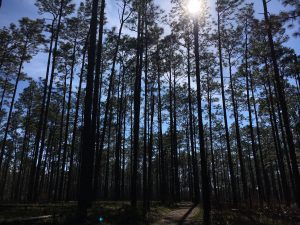
Sandhill pine forest at Blackwater River State Park
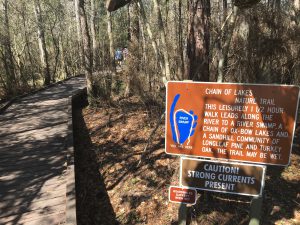
2737 – Chain of Lakes trailhead at Blackwater River State Park
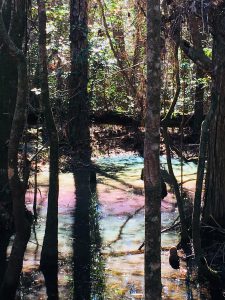
“Rainbow Swamp” on the Chain of Lakes trail at Blackwater River State Park
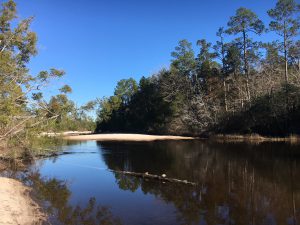
Beautiful sandy beaches along the Blackwater River in the State Park.
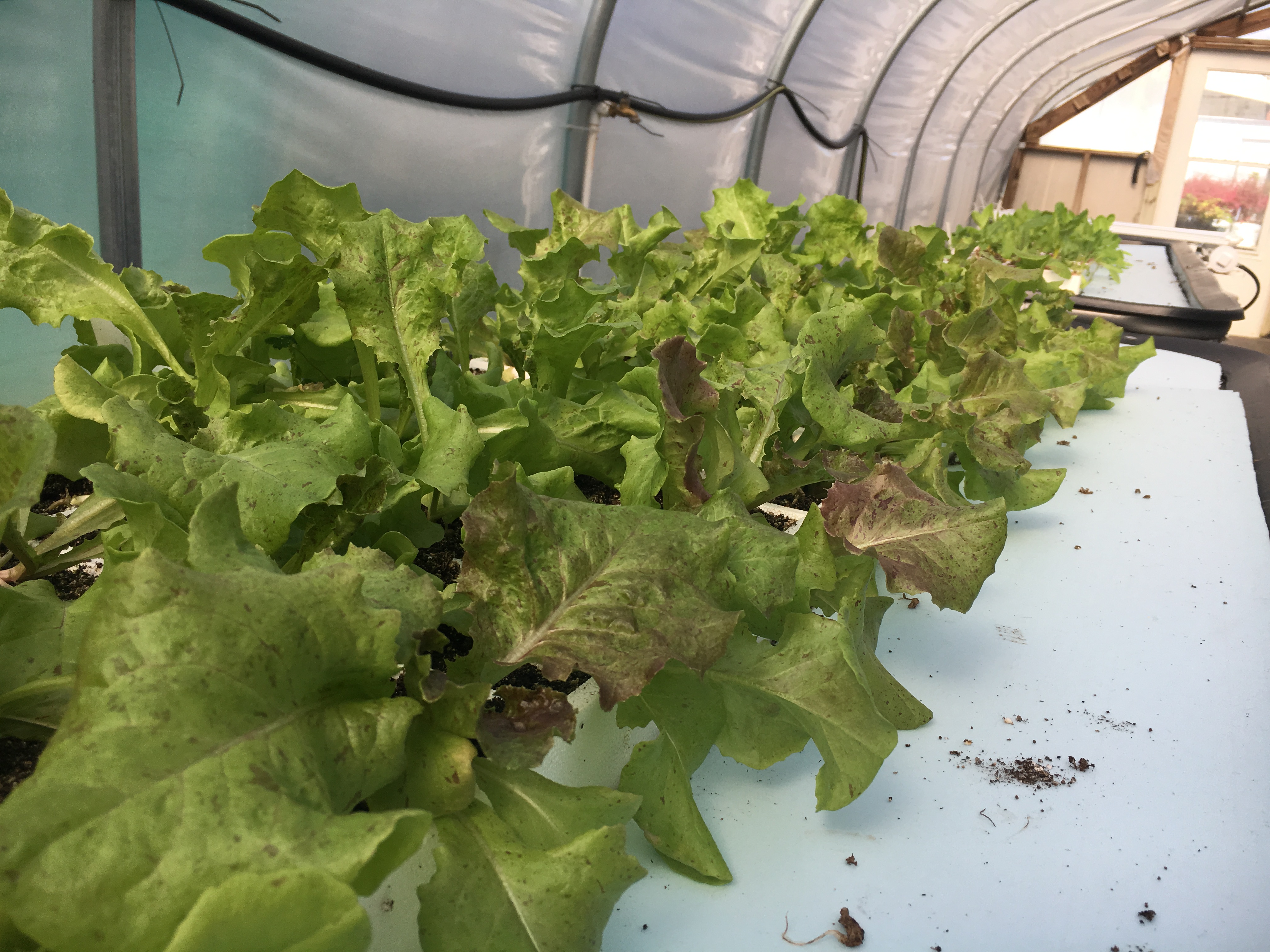
by Laura Tiu | Mar 9, 2018
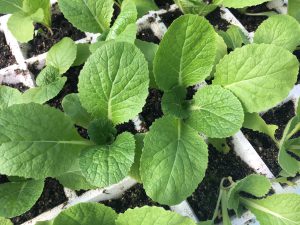
Aquaponic Napa cabbage
There is growing interest in hobby-scale farming techniques. In response to this need, UF/IFAS Walton County Extension Office established a hobby farm featuring a variety of low-input food production options. The farm is a cooperative venture drawing on expertise of the Horticulture, Aquaculture/Marine Science, 4-H, and Agriculture programs. The farm is on a relatively small, tenth acre, plot behind the County Extension Office where staff and volunteers have installed aquaponics and hydroponics systems, honeybee boxes, a chicken coop as part of the 4-H Chick Chain Program, herb garden, raised vegetable bed system, sustainable citrus grove, muscadine grape trellis, shiitake mushroom structure, and blueberry orchard.
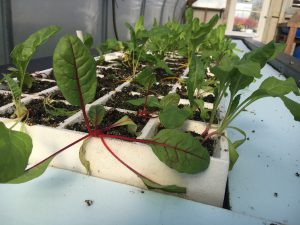
Aquaponic Swiss chard
The aquaponics demonstration system was constructed in 2017 using materials purchased at local stores, Tractor Supply Company and Lowes, or on Amazon.com. The system has a 300 gallon Rubbermaid fish tank that gravity feeds into a 20 gallon plastic garbage can with lid stuffed with bird netting for solids removal and biofiltration. The water then feeds into two 2 ft. x 8 ft. feed troughs with approximately 2 square yards of floating Styrofoam grow beds. Finally the water drains into a 100-gallon sump where it is pumped back into the fish tank. A small air pump provides supplemental air to the fish tank and a small water heater helped maintain temperatures during the winter.
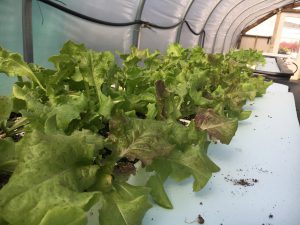
Aquaponic red lettuce
The fish tank is stocked with 18 catfish, originally 4-5 inches, now approximately 10-12 inches, and pushing a half-pound each. The system produced two crops of red and romaine lettuce during the last half of 2017 and is currently planted with romaine and red lettuce, Swiss chard and Napa cabbage. Lettuce is harvested out of the system every five to six weeks, while Swiss chard and Napa cabbage a take longer to reach harvest size.
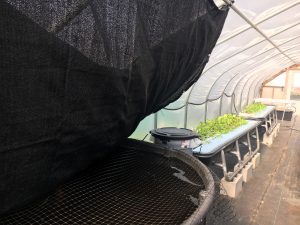
Walton County demonstration aquaponics system.
There is a lot of aquaponics information available on-line. Academic institutions and other research-based organizations are the best places to look for information. The University of Florida has a comprehensive factsheet entitled “A Practical Guide for Aquaponics as an Alternative Enterprise” available at http://edis.ifas.ufl.edu/hs1252. Also recommended is the Food and Agriculture Organization “Small-scale Aquaponic Food Production” manual available at http://www.fao.org/3/a-i4021e.pd.
Aquaponic seminars or webinars are conducted upon request and provide introductory information on a variety of system designs and stocking options. Over 400 visitors have seen the aquaponics and other hobby-scale gardening demonstration plots over the past year, gaining knowledge and acquiring skills to use in their own gardens. If you are interested in a signing up for the aquaponics email listserv, participating in a tour, having a personal consultation or attending a workshop, please contact Laura Tiu, lgtiu@ufl.edu.
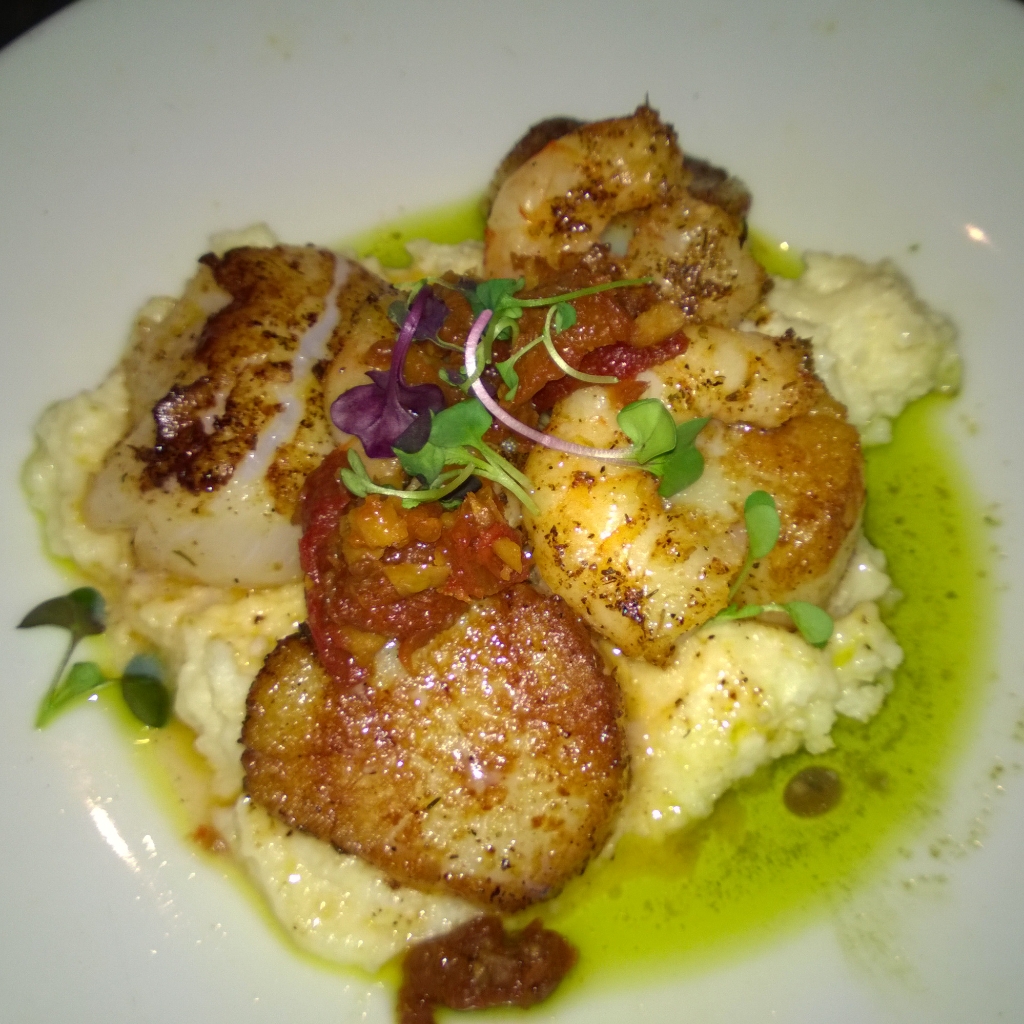
by Laura Tiu | Feb 16, 2018
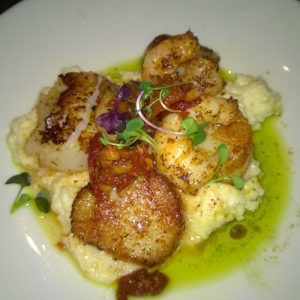
Scallops and shrimp over grits.
I have been involved in the aquaculture industry since the late 1980’s when I got my first job out of college on a tropical fish farm in Plant City, FL. As you can imagine, the industry has changed a lot since then. When folks find out I have worked in aquaculture, the same question seems to arise: “Is farm-raised fish safe to eat as wild caught?” I would like to say that I don’t understand where this question comes from, but over the years I have seen a bewildering number of mass media headlines touting misinformation about farm-raised fish and not enough touting the benefits. In fact, I saw a post this week on Facebook actually claiming that tilapia have no skin or bones and cannot be found in the wild, both not true. It is no wonder people are so confused. Many of the claims made are not research-based and a quick review of the scientific literature will disprove the statements, but who has time for that?
Aquaculture currently supplies over fifty percent of all seafood consumed and will expand in the future due to a limit on the amount of wild fish that can be sustainably harvested, and increasing demand by a growing population. Sustainable, responsible aquaculture is needed to fill that gap. Fish are farmed using a variety of production methods including ponds, raceways, recirculating land-based systems and in ocean net pens. Each one of these fish species and production methods comes with pros and cons, similar to the production of livestock and fruits and vegetables. Each species can be evaluated based on its environmental impact, production method and even country of origin.
The American Heart Foundation recommends eating fish (particularly fatty fish rich in Omega-3s) two times per week. We currently only consume about half of that. This recommendation includes a variety of farm-raised and wild-caught fish. Both are crucial to meet current and future demand for seafood and omega-3 fatty acids. A common misconception is that farmed fish is not as healthy or nutritional valuable as wild caught fish although this claim has been largely disproven. One recent paper (Trushenski et al, 2017) compared the nutritional values of wild-caught and farmed bluegill, largemouth Bass and hybrid striped bass and concluded that the farmed fish provided more long-chain polyunsaturated fatty acids (LC-PUFAs) per portion that wild fish, however both are excellent sources of high quality protein and nutrients.
With the Lenten season upon us, a time of a traditional increase in seafood consumption, what is an easy way to choose wild and farm-raised seafood? One website and smartphone app that I find easy to use is Seafood Watch (www.seafoodwatch.org). Seafood Watch uses an extensive evaluation system using research and a panel of experts to label seafood products as green (best choice), yellow (good alternative) and red (avoid) depending on the variety’s sustainability.
With this information and a little bit of homework, I hope you come to the same conclusion that I have. Both farm-raised fish and wild-caught fish are delicious, nutritious and great additions to your diet.
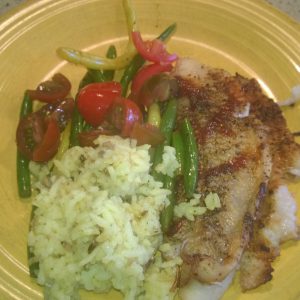
Baked tilapia, rice and vegetable medley.



















